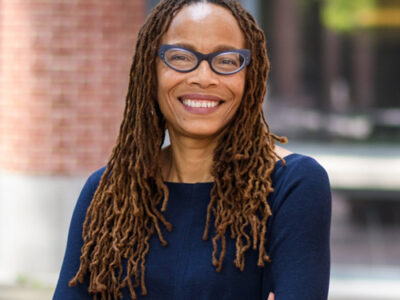
A woman dies in childbirth every 90 seconds. Women get paid 18.6 percent less then men for doing the same job. There are 10 “corrective rapes” per week—perpetrated as punishment for victims’ perceived sexual orientation—in Cape Town, South Africa.
The inaugural symposium at the School of Nursing’s Center for Global Women’s Health offered a sadly familiar litany of disquieting statistics. But it also featured reports on an unusually inventive crop of research and advocacy programs aimed at improving women’s lives and livelihoods. Take Nancy Glass, head of the Global Women’s Center at John Hopkins School of Nursing—and fervent believer in the transformative potential of pig farming.
“If you’d asked me four years ago if I’d be a pig farmer in Africa, it would not have occurred to me,” Glass said, allowing herself a laugh during her talk about the NIH-funded agricultural-microfinance program she runs, Pigs for Peace.
And yet, “I have a pig,” she went on. “Her name is Susan, in honor of my mother.”
Glass’s organization helps Congolese women recover from violence, rape, and displacement by loaning them pigs. The non-profit also provides a short course on animal husbandry and contact with a veterinarian. The loan is repaid with one piglet from each of the sow’s first two litters. “The breeding of animals helps women” not just economically, but socially, Glass explained. Congolese women with economic clout are less likely to be stigmatized for being raped. Glass refers to her work as “action-research.” On the one had, the project is concerned with collecting data, designing mental health surveys, and evaluating the successes and failures of different approaches. But “we have made a commitment from day one that we would not do research without service.” The overarching goal is to help Congolese women thrive. “A woman said to me, ‘I was asleep. When I got the pig, I woke up,’” Glass remarked. “I have not seen that on a mental health survey yet. But I think we all know what she means.”
The symposium was a milestone for the center, which opened last July, not only because this was its first major conference, but because it recently received a generous gift that will fund visiting global scholars. The Soad Hussein Hassan Visiting Global Scholar program was endowed by a gift from Martin Silverstein GL’08 and Audrey Silverstein C’82.
“Here we are, the most advanced people in our era … and we’re still talking about these statistics,” said Zainab Salbi, the conference’s keynote speaker, referring to the myriad shortcomings in women’s health outlooks around the world. “We still have to make the argument for why women matter. We still have to open centers to remind ourselves why women matter.”
Salbi shared her experience with Women for Women international, an NGO she founded that works with women survivors of war to reestablish their lives. “But I say, ‘Go and try it all.’ There is not one formula,” she remarked. “No shyness, no hesitation.”
It was clear that conference panelists shared Salbi’s spirit. Empowerment was the word of the day. And each presenter had her own way of achieving it.
Even panelists engaged in academic research more traditional than pig-lending tended to approach their work from new angles, with an emphasis on end results. University of Illinois nursing professor Tonda Hughes presented research on health disparities among lesbian, bisexual, and transgender women. She began by sharing what researchers have already found: “Violence of all forms—physical, sexual, in adulthood, in childhood—occur more often in sexual-minority women.” According to Hughes, such women are stigmatized everywhere; homosexuality is a criminal act in 76 countries, and even in the US, in 29 states it’s legal to fire someone for being openly gay, she said. But looking forward, Hughes explained that she and other researchers are beginning to take a whole new approach. “Rather than ask the question, why are there sexual-orientation-related health disparities, we need to be asking, why aren’t there more?” Hughes said. Some new research is looking at how certain sexual-minority women are able endure and overcome obstacles. “We need to find out how to support and promote that resilience.” Contemporary researchers, according to Hughes, are “shifting toward the direction of looking for resilience. And such a shift has amazing potential to empower sexual-minority people.”
The panelists’ backgrounds were as diverse as their approaches. Whereas Glass and Hughes are both professors of nursing, Karen Patricia Williams, who works on encouraging breast- and cervical-cancer prevention screenings among African-American, Latina, and Arab women, is a professor of biology at Michigan State. Other panelists came from outside the realm of medicine. Susan Sorenson, a professor at Penn’s School of Social Policy and Practice, spoke about strategies to prevent violence against women, globally. Eugenie Birch, co-director of the Penn Institute for Urban Research, talked about designing cities to help women better manage isolation, vulnerability, and discrimination.
One issue came up repeatedly—the inclusion of men in programs aimed at promoting women’s prospects.
“I used to be very angry at men, I have to admit,” Salbi said. After all, she worked with rape victims on a daily basis. But, “We have to reach out to them, not out of anger but out of compassion,” she continued. “We need to engage men in a different way.” Reform is about “helping men find a new version of masculinity.”
Indeed, Glass reported that a third of the participants in Pigs for Peace are men, and their inclusion has helped discourage them from sabotaging the project. And in her own presentation about violence against women, Sorenson talked about the importance of technology in redefining attitudes toward domestic violence in India and Iraq.
As a whole, the conference’s message was that improving the status of women must entail addressing a number of disparate, complicated issues. As Salbi remarked in her keynote speech, in order to participate in a growing world economy, a woman “needs to be healthy. And to be healthy she needs to go to school, she needs to be educated, she needs healthcare, she needs to be happy. She needs all of these things.”
—Maanvi Singh C’13




